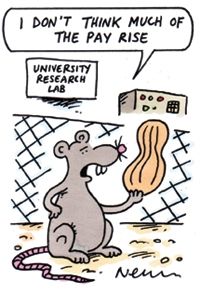
• Despite his donnish air, David Willetts continues to take a kicking from academics, with the University of Leeds becoming the second institution to register a vote of no confidence in him. The Leeds senate backed a motion condemning the universities and science minister's handling of higher education reforms on 6 July. Dons at the University of Oxford delivered a no-confidence vote last month. David Barclay, president of the Oxford University Student Union and founding member of the No Confidence Campaign, said Leeds' decision was "a huge step forward in the fightback against the government's disastrous plans for universities".
• Letter writers in the national press offered contrasting views on elitism in higher education. After a Sutton Trust survey found a handful of schools dominated Oxbridge admissions, John Bailey wrote to The Guardian on 9 July to highlight his son's success in winning funding for a PhD at Goldsmiths, University of London. "The apparent obsession with Oxbridge and so-called elite universities does great damage to the rest of the higher education sector, diminishes the achievements of thousands of students and reflects the current, unattractive triumph of a privileged minority," he says. However, in response to a story on the social backgrounds of judges, Philip Roe writes to The Times: "If I had to appear in front of a judge I would look him up in Who's Who and if he were not a graduate of Oxford or Cambridge I would want to know why not."
• Higher education's hierarchy is to be accentuated by the creation of an English "Ivy League", according to one newspaper. With the government planning to allow universities to recruit unlimited numbers of students with grades of AAB or higher at A level, the Higher Education Funding Council for England was set to publish data this week showing at which universities such students are located. "The reform is expected to lead to a concentration of students with the highest grades in a small group of universities," The Sunday Times said on 10 July. The universities of Oxford, Cambridge, Bristol, Durham and the London School of Economics were expected to have the highest concentrations of AAB students, while Liverpool and Essex were among the Russell and 1994 group universities "expected to appear far lower down the league table".
• Did David Willetts lead a party of intrepid vice-chancellors to South America in search of a "Brazilian bailout"? The universities and science minister's delegation to Brazil last month agreed that the UK would host 10,000 Brazilian students over four years - with a further link-up on research a possibility. The Observer said on 10 July that the deal raised concerns that "the government's funding model for higher education is becoming increasingly reliant on attracting overseas nationals". Usman Ali, vice-president for higher education at the National Union of Students, accused Mr Willetts of "spending his time touting for a Brazilian bailout to the student funding chaos he created".
• What does £150 mean to those working in higher education? For some vice-chancellors it might mean a good bottle of wine; for most of their staff it looks like being this year's pay rise. The Universities and Colleges Employers Association met with the sector's five trade unions on 11 July, making a "final offer" of a £150 rise for 2011-12. Even for staff at the bottom of the national pay spine - £13,203 a year - the rise would be just 1.1 per cent. A Ucea spokesman cited the public sector pay freeze, financial challenges and uncertainty over higher education reforms as the "context" for the pay discussions.
• When plans for the £18,000-a-year New College of the Humanities were announced last month they provoked some heated criticism. But Anthony Grayling, the professor of philosophy who will head the institution, said on 12 July that progress was "ahead of schedule" and that 160 applications had been received from academics seeking work. He added that, despite the high fees, none of the college's backers was expecting to make "a quick return".
Register to continue
Why register?
- Registration is free and only takes a moment
- Once registered, you can read 3 articles a month
- Sign up for our newsletter
Subscribe
Or subscribe for unlimited access to:
- Unlimited access to news, views, insights & reviews
- Digital editions
- Digital access to THE’s university and college rankings analysis
Already registered or a current subscriber?